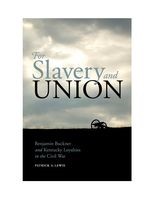For Slavery and Union: Benjamin Buckner and Kentucky Loyalties in the Civil War
For Slavery and Union: Benjamin Buckner and Kentucky Loyalties in the Civil War
Cite
Abstract
Through a biography of Kentucky lawyer, soldier, and politician Benjamin F. Buckner (1836–1901), this book reorients the narrative of Civil War–era Kentucky around the experience of conservative proslavery unionists such as Buckner who resisted secession in 1861 because they believed slavery had safer prospects in the United States than in the new Confederacy. After the Emancipation Proclamation was issued, this faith in a proslavery federal government collapsed, and Buckner, who had led Union troops in combat in 1861 and 1862, resigned from the army in April 1863. The book is built around these war years and a revealing body of personal correspondence from Buckner to his rebel fiancée, Helen Martin. Looking both forward and backward in time from Buckner’s war experience, the book uses Buckner’s life and career to reintegrate the fractured historiographies of slavery, secession, politics, war, domesticity, emancipation, Civil War memory, industrialization, and regionalism in Kentucky. The collapse of slavery provided a window of opportunity across the South for significant social change. That window was never truly opened in Kentucky ironically because of its wartime loyalty to the Union. Though they could not save slavery, Buckner and political allies leveraged their loyalty during Reconstruction to delay the advent of civil rights for African Americans, suppress those rights by paramilitary violence, and undermine the Fifteenth Amendment in a pivotal Supreme Court case. Buckner’s life shows how many of the same inequalities, conflicts, and contradictions inherent in antebellum Kentucky were consciously re-created, expanded upon, and reinforced in the latter decades of the nineteenth century.
Sign in
Personal account
- Sign in with email/username & password
- Get email alerts
- Save searches
- Purchase content
- Activate your purchase/trial code
Institutional access
-
Sign in through your institution
- Sign in with a library card Sign in with username/password Recommend to your librarian
Institutional account management
Sign in as administratorPurchase
Our books are available by subscription or purchase to libraries and institutions.
Purchasing information| Month: | Total Views: |
|---|---|
| January 2023 | 1 |
| January 2023 | 3 |
| April 2023 | 1 |
| April 2023 | 1 |
| July 2023 | 2 |
| July 2023 | 2 |
| July 2023 | 2 |



Get help with access
Institutional access
Access to content on Oxford Academic is often provided through institutional subscriptions and purchases. If you are a member of an institution with an active account, you may be able to access content in one of the following ways:
IP based access
Typically, access is provided across an institutional network to a range of IP addresses. This authentication occurs automatically, and it is not possible to sign out of an IP authenticated account.
Sign in through your institution
Choose this option to get remote access when outside your institution. Shibboleth/Open Athens technology is used to provide single sign-on between your institution’s website and Oxford Academic.
If your institution is not listed or you cannot sign in to your institution’s website, please contact your librarian or administrator.
Sign in with a library card
Enter your library card number to sign in. If you cannot sign in, please contact your librarian.
Society Members
Society member access to a journal is achieved in one of the following ways:
Sign in through society site
Many societies offer single sign-on between the society website and Oxford Academic. If you see ‘Sign in through society site’ in the sign in pane within a journal:
If you do not have a society account or have forgotten your username or password, please contact your society.
Sign in using a personal account
Some societies use Oxford Academic personal accounts to provide access to their members. See below.
Personal account
A personal account can be used to get email alerts, save searches, purchase content, and activate subscriptions.
Some societies use Oxford Academic personal accounts to provide access to their members.
Viewing your signed in accounts
Click the account icon in the top right to:
Signed in but can't access content
Oxford Academic is home to a wide variety of products. The institutional subscription may not cover the content that you are trying to access. If you believe you should have access to that content, please contact your librarian.
Institutional account management
For librarians and administrators, your personal account also provides access to institutional account management. Here you will find options to view and activate subscriptions, manage institutional settings and access options, access usage statistics, and more.